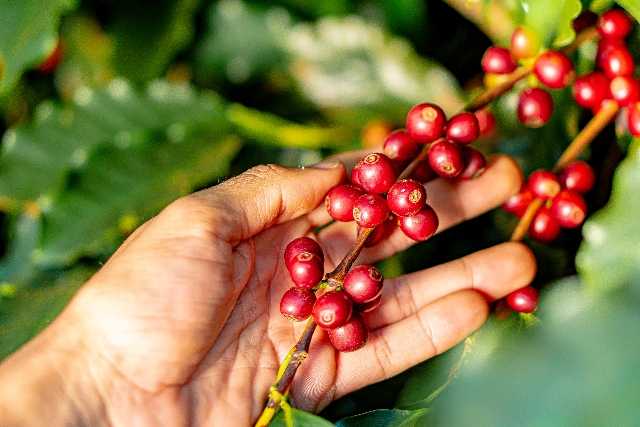CERRADO MINEIRO, Brazil – In the wake of the debates on climate change during COP 28, the Institute of Forest and Agricultural Management and Certification (Imaflora) published a study on Greenhouse Gas (GHG) emissions, carried out on coffee farms in the Cerrado Mineiro region, which shows that the farms sequester more carbon than they emit. The institute assessed 20 properties associated with the Cerrado Coffee Growers’ Cooperative (Expocacer), using the Carbon On Track service platform, and found a negative emissions figure of -0.2 ton of carbon dioxide, equivalent to one hectare per year.
This phenomenon occurs when carbon sequestration from the soil and plants is greater than emissions, and by analyzing the farms’ GHG emission estimates, Imaflora arrived at an absolute value of 15,400 tCO2e.year-1, which is considered low.
The use of organic fertilizers (chicken litter, cattle manure, etc.) and vegetable waste (from pruning, straw and grasses) used on the analyzed farms was a positive factor in mitigating greenhouse gases, to the detriment of adding chemical nitrogen. The addition of these inputs can also increase the amount of carbon stored and improve soil quality, which in the medium and long terms increase nutrient cycling, porosity and water retention in the soil.
“Expocacer’s members are always at the forefront of technology, innovation and sustainability. The carbon balance carried out in partnership with Imaflora showcases the sustainable work that our members have been doing for over 10 years. We’re moving forward together, towards an increasingly sustainable, low-emission coffee plantation,” said Farlla Gomes, Expocaccer’s Technical Coordinator for Sustainability.
Also according to the survey, other relevant aspects to be considered are increased energy efficiency in the use of machinery, which can be achieved with improved process traceability and georeferenced technology, contributing to the reduction of diesel, man/machine ratio and soil compaction.
“The Carbon on Track platform carries out a series of studies on agriculture on demand. In the coffee sector, the emphasis remains: farms with more sustainable agricultural techniques are not only able to reduce their emissions, but also contribute to carbon sequestration. This carbon-negative grain gains added value and shows that sustainability is good business,” believes Alessandro Rodrigues, Projects and Services Coordinator for Imaflora’s Climate and Emissions area.
For Expocacer, the trend towards reducing greenhouse gases is something that should be followed by other farms around the world. Every farm has the potential to contribute, for example, by applying organo-mineral fertilizers and organic compounds instead of chemical ones.
If it is necessary to use chemical fertilizers because the cost is lower, they should be used via fertigation (aquammonia), avoiding the spraying of pure urea or formulated fertilizers. Straw and bark waste can also be reused in the form of organic compost to reduce the potential mineralization of nitrogen in the soil, there are many ways to achieve sustainable production.
The cooperative was recently named the first coffee cooperative in the world to be awarded the Regenerative Certification by Regenagri, a global organization that aims to guarantee the health and preservation of the soil, with certification from the British Control Union.
This seal confirms the integrity of the cooperative’s processes in receiving and processing certified regenerative coffees, highlighting the sustainable practices that are carried out, such as renewable energy, selective collection and the traceability of stored coffees, following the product’s journey from its entry into warehouses, to distribution centers and to consumers.
The study also points out that the use of sustainable practices helps to reduce greenhouse gas emissions in the long term, as they tend to improve soil quality and reduce the use of external inputs such as nitrogen, phosphorus and glyphosate.
Scope of the study
Expocacer’s cooperative farms, that took part in this project are located in the region of Patrocínio, Minas Gerais, in the Cerrado biome. The average coffee production area of these farms is 192.4 ha, ranging from 40 to 371 ha with very dense areas, with an average stand of 4,370 plants.ha-1. This farms are generally fertirrigated and highly mechanized (planting, fertilizing and harvesting are mechanized in most areas). The average yield was 30.6 bags.ha-1, considered above the Brazilian average (21 bags.ha-1).
“Our intention is to promote real sustainability, in line with our purpose of inspiring, fostering and nurturing cutting-edge coffee growing linked to impact. We understand that the market is increasingly demanding and that we have to meet and accompany the movement towards a healthy environment. To this end, we have an exclusive department for sustainability issues, where we also guide and encourage good practices among our members,” says Simão Pedro de Lima, Managing Director of Expocacer.
Carbon on track
This is an Imaflora program designed to raise the profile of low-carbon Brazilian agriculture and forest restoration on the climate agenda. Through the program, agricultural enterprises can contract the calculation of the carbon balance that shows the estimated emission and removal of greenhouse gases from their activities, based on internationally recognized methodologies.
About Expocacer
Established in 1993 and located in Patrocínio/MG, the Cooperativa dos Cafeicultores do Cerrado (Expocacer) promotes coffee quality and the work of its members in Brazil and around the world through significant socio-environmental initiatives and contributions to the regional economy.
The cooperative’s infrastructure includes two warehouses with a capacity for over 1 million bags. Currently, they serve 680 producers, exporting to more than 30 countries across 5 continents.


















